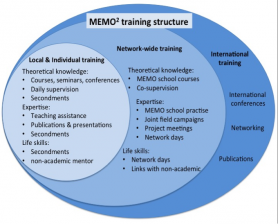Training
The MEMO2 training program follows a holistic approach including disciplinary/interdisciplinary elements, individual/collective training, and theoretical/practical courses, all aiming to prepare the ESRs with key competences to tackle scientifically complex and societally relevant issues. Targeted competences in MEMO2 are the ability to: I) effectively and interactively use and develop tools such as innovative technologies, knowledge, and languages in an interdisciplinary way, II) act autonomously within the “big picture” of climate sciences, III) function and interact synergistically within a socially heterogeneous group, and IV) responsibly conduct and manage a challenging research project within 3 years.
 In MEMO2, we will teach each ESR an ensemble of different knowledge, expertise, and life skills, both at individual and collective levels. These skills are the elements that are needed to develop the target competences, within or outside the project. For example, successfully organizing a field campaign requires individual theoretical knowledge (about the science of the measurements made), expertise (on the instruments deployed), and personal skills (organization, discipline, and autonomy), but also key collaborative skills (communication, language, reaching compromises, developing synergies).
In MEMO2, we will teach each ESR an ensemble of different knowledge, expertise, and life skills, both at individual and collective levels. These skills are the elements that are needed to develop the target competences, within or outside the project. For example, successfully organizing a field campaign requires individual theoretical knowledge (about the science of the measurements made), expertise (on the instruments deployed), and personal skills (organization, discipline, and autonomy), but also key collaborative skills (communication, language, reaching compromises, developing synergies).
The training offered in MEMO2 consists of I) local & individual training, II) network-wide training, and III) international training.
An important aspect of the individual training program is associated with Secondments. Complementary to the main scientific project, each ESR will have at least two, most of them three mandatory secondments. The duration depends on the research goals, the precise nature of the interaction and on the specific training needs. Short secondments will last 1-2 weeks and intensive secondments will include practical work up to several months. The secondments are crucial for the ESR training and for building up and maintaining their active professional network. During secondments, ESRs will gain theoretical knowledge, practical expertise, and personal skills, and experience different research cultures. The consortium as a whole will benefit from the secondments via intensive knowledge exchange, which is explicitly desired for the individual projects.

